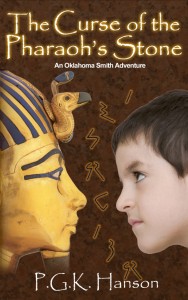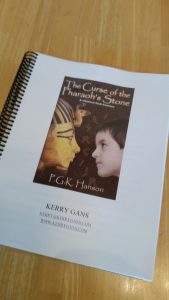 I met with most of my beta readers this week for my middle grade manuscript The Curse of the Pharaoh’s Stone. My daughter’s wonderful school librarian put together an amazing local team of readers—4 kids, 2 teachers, a librarian, and a mom of middle grade kids. I also have 2 other incredible teachers and authors reading it. I am so excited to get their feedback!
I met with most of my beta readers this week for my middle grade manuscript The Curse of the Pharaoh’s Stone. My daughter’s wonderful school librarian put together an amazing local team of readers—4 kids, 2 teachers, a librarian, and a mom of middle grade kids. I also have 2 other incredible teachers and authors reading it. I am so excited to get their feedback!
Yes, I said excited. I know many writers get butterflies when they send their manuscript babies out to beta readers. Some writers are downright terrified. And I agree, when you let your work out into the world, even in beta, it can be scary. You’re opening yourself up to criticism, to the possibility that people won’t love your story as much as you do. Sometimes writers even see criticism at this stage as a failure on their part.
But I am strange—I love honest feedback. I think it comes from how my writing process evolved in a collaborative model with my best friend Donna Hanson Woolman. Then when I got my Master of Arts in English, my advisor was a blunt yet positive critiquer. Of course, if the criticism is personal or nasty in nature, I don’t like that any more than the next writer, but in this post I am talking about thoughtful and honest feedback.
I enjoy the red pen on my manuscript because of my mindset. I am confident that Pharaoh’s Stone is a good book. Its plot is solid, its characters rounded, and the prose is clean. I have read enough middle grade—both published and from an agent’s slush pile—to know my book is good. I am excited to get my beta readers’ feedback because I know that their feedback will get the book from good to great.
 That’s how we writers have to approach any constructive feedback—as a way to make our manuscripts better. A challenge to dig deeper and raise our craft higher. After working so long and hard on our stories (I’ve been with Pharaoh’s Stone for 11 years), we can lose the objectivity we need to make the final adjustments that will make our work shine.
That’s how we writers have to approach any constructive feedback—as a way to make our manuscripts better. A challenge to dig deeper and raise our craft higher. After working so long and hard on our stories (I’ve been with Pharaoh’s Stone for 11 years), we can lose the objectivity we need to make the final adjustments that will make our work shine.
That’s why beta readers are such an important part of our writing process. They bring fresh eyes, fresh brains, and a fresh perspective. I am so lucky to have an enthusiastic team reading my book, and I am so grateful to all of them for making the time and effort to help me.
Do you use beta readers? Where does their feedback fit into your process?
Top 5 Reasons to Cultivate a Writing Community
This week, while preparing the Author Chronicles’ Top Picks Thursday, I read an article from an antisocial writer who really didn’t want to participate in the writing community. Many writers are introverts, so being hesitant about reaching out to others is understandable. I am a raging introvert myself, but when I think about the writing community I am part of, I cannot imagine pursuing this career alone. Here are 5 reasons why:
Craft – Your community can help you hone your craft before you spend money on editors. From critique partners to beta readers, they will give you honest feedback and handy tips to bring your craft to the next level.
Companionship – If you are like me, it takes a lot to drag you out of your house. Offer me a Writers’ Coffeehouse, a Philadelphia Writers’ Conference, a workshop, or a critique group, and I’m there. Plus, writers are good at being alone together. It is not uncommon in my area to find a group of writers sitting together at a Wegman’s or Starbucks, completely silent except for the furious clicking of their keyboards.
Camaraderie – This is different than Companionship, in that it references the deeper emotional support we get from our writing community. Who but other writers understand the frustration of not finding the exactly right word, or the pain of being rejected for the 100th time, or the elation of placing your first story in even a little-known publication? The emotional lift we get from other writers revs us up and sends us back to our writer’s grottoes ready to face the next challenge.
Collaboration – Usually we think of this in the creative sense, where two or more writers work together on a project. A writing community certainly fosters this, because how else can you meet people to collaborate with? But there are other types of collaboration, such as helping you negotiate a publishing issue or brainstorm a marketing strategy. Two heads are very often better than one.
Connection – Our writing communities are an invaluable resource for networking. We can find editors, agents, publishers, experts, beta readers, critique partners, marketing opportunities and collaborators through our community. The community can help spread the word when we have a new book out. Our community keeps us abreast of the latest news in publishing, the latest scams to beware, and the latest accomplishments of our friends.
I am forever thankful for the people in my writing community: the Writers’ Coffeehouse, the Philadelphia Writers’ Conference, workshop-mates, and of course my critique partners. There are so many people who have cheered me on, cheered me up, and made this journey so much more enjoyable.
Walk this path alone? Inconceivable.